Book Charges Colonial Empires Trying to Control Africa Through Birth Control & Abortion : A Well Thought Out Scream by James Riordan
A number of years back I wrote a book with John Rucyahana entitled The Bishop of Rwanda. The book was about John’s life but focused on the Rwandian genocide where one million, one hundred and seventeen thousand (1,117,000) Tutsis were brutally murdered in 1994 in an effort to eliminate the entire tribe from the face of the earth. You will often hear a much lesser body count because people try to minimize the tragedy. But as John said to me once, “We know that many were killed because we found that many bodies.” Most of the murders were horribly violent because the primary weapons used were machetes which means men, women and children were literally chopped to death.
John Rucyahana
The machetes were purchased by France and given to the Hutu controlled government of Rwanda along with training from a French kill squad on how to best organize and carry out a mass murder of this proportion. Some people like to say the genocide was a tribal war. It was no war. The army of Rwanda attacked and murdered people in their villages, most of them without warning. There had been mass attacks before but the poor villagers would flee to the churches which would give them asylum. This time the army went to the churches before the attacks started and told them to let the people in and then call the army. I visited one church where five thousand people were massacred. France tried to hide their involvement by having the machetes purchased through Egypt, but the truth came out. So why was France so eager to help murder all these innocent people? Ultimately, it is always for the same motive — power. If the Tutsis ever took control of the government it would be Anglican based and side with the English speaking nations in the United Nations like neighboring Uganda. As long as the Hutus stayed in power. the government would be Francophone based and side with the French speaking nations in the U.N.
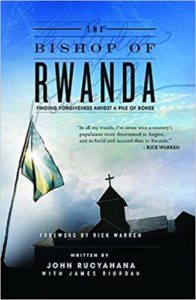 Up until the Belgian occupation in 1916, the Tutsis and Hutus had lived in peace together for over five hundred years, but the standard European method of conquest was divide and conquer. So the Belgiasn began turning the two prominent tribes of Rwanda against each other. At that time, there were roughly a million Tutsis and eight million Hutus. Following the textbook method of conquest, the colonial rulers favored the smaller group (the Tutsis) with positions of leadership and good education and made them overseers of the Hutus who were forced to harvest crops, build roads and any other menial labor that was to be done. Gradually, of course, the Hutus began to first resent and then hate their Tutsi task masters. When the Belgians left in 1945 they did nothing to undo the mindset they had created. Elections were held and, because of their vast majority, the Hutus won. Then, over the next forty years, the system was completely reversed. The Hutus ran the government, received the best education and all the privileges. The media was totally slanted toward the Hutus even to the point of “hate radio” which broadcast anti-Tutsi messages around the clock. There were violent breakouts on a regular basis and many Tutsi’s fled the county. By the early 90’s the government began planning what they called “the ultimate solution” — killing every Tutsi in the country. Hutu men who had married Tutsi wives were forced to kill their own families. The evil unleashed in April of 1994 is almost unfathomable and certainly demonic in nature. I interviewed many prisoners who told me that “something” took them over and all they felt was hate. One man said, “I killed babies! I had babies of my own. I loved babies and yet I murdered them along with the rest.”
Up until the Belgian occupation in 1916, the Tutsis and Hutus had lived in peace together for over five hundred years, but the standard European method of conquest was divide and conquer. So the Belgiasn began turning the two prominent tribes of Rwanda against each other. At that time, there were roughly a million Tutsis and eight million Hutus. Following the textbook method of conquest, the colonial rulers favored the smaller group (the Tutsis) with positions of leadership and good education and made them overseers of the Hutus who were forced to harvest crops, build roads and any other menial labor that was to be done. Gradually, of course, the Hutus began to first resent and then hate their Tutsi task masters. When the Belgians left in 1945 they did nothing to undo the mindset they had created. Elections were held and, because of their vast majority, the Hutus won. Then, over the next forty years, the system was completely reversed. The Hutus ran the government, received the best education and all the privileges. The media was totally slanted toward the Hutus even to the point of “hate radio” which broadcast anti-Tutsi messages around the clock. There were violent breakouts on a regular basis and many Tutsi’s fled the county. By the early 90’s the government began planning what they called “the ultimate solution” — killing every Tutsi in the country. Hutu men who had married Tutsi wives were forced to kill their own families. The evil unleashed in April of 1994 is almost unfathomable and certainly demonic in nature. I interviewed many prisoners who told me that “something” took them over and all they felt was hate. One man said, “I killed babies! I had babies of my own. I loved babies and yet I murdered them along with the rest.”
The only reason the genocide did not completely wipe ou the Tutsis is that Paul Kagame, an exiled Tusti living in Uganda, raised an army and attacked Rwanda and overthrew the ruling government in the middle of the genocide. He just won his third term as the president of Rwanda by a landslide, extending his 17-year rule over the central African nation.
Paul Kagame (Left and Right)
But the heart of the book is the programs of confession and forgiveness that Bishop John established with Paul Kagame’s help. The subtitle of The Bishop of Rwanda is Finding Forgiveness Amidst a Pile of Bones. After the genocide virtually every adult male in Rwanda had either killed someone or lost a close family member. The miracle was the healing of the nation that happened through the national confession and forgiveness programs, but even more importantly, through the power of Jesus Christ. Today, Rwanda is a living miracle.
Nearly every bad thing that has ever happened on a large scale in Africa can usually be traced to white Europeans. When I walked the streets of Kilgali amidst chants of “zum, zuma, mazuma” which all of which basically mean white man, I could not fault the people because not only had the white man done great evil to their land, they also refused to acknowledge it or even try to stop it when it got out of hand. Bill Clinton once said his greatest regret as President was doing nothing to stop the Rwanda genocide. None of the power nations came to help because Rwanda has no oil and no other vast resources. They just had a beautiful country and some of the kindest and most loving people in the world…until the white man came.
So it is no wonder that Obianuju Ekeocha, the founder of Culture of Life Africa, has written a new book that charges the powerful white nations with now trying to control Africa through birth control and abortions. In her book, Target Africa: Ideological Neo-colonialism in the Twenty-First Century (released earlier this year), Ekeocha claims this new form of colonization is rooted in a master-slave mindset, and documents the nefarious funding streams and political schemes behind this injustice.
There is no question that Africa has struggled ever since the end of colonization with all kinds of political and socio-economic issues, but Ekeocha claims that rich donors from the West are exploiting these problems and assuming the role of savior and by providing “solutions” that she maintains are contrary to the values of most African people.
Obianuju Ekeocha
The book reveals the Western influence over Africa that is rarely talked about. Drawing from a broad array of well-sourced materials and documents, it tells the story of foreign aid with strings attached, the story of Africa targeted and recolonized by wealthy, powerful donors. Ekeocha also unpacks how, through complicated schemes, even small organizations like the U.K.-based Population Matters markets a sense of self-righteousness to donors, allowing them to feel virtuous by buying environmental credit of sorts for the electricity and energy they consume. For every child born in Africa they ask their donors to give a certain amount of money based on their CO2 emissions.
A vivacious international pro-life advocate, Ekeocha, who is Nigerian by birth and is now based in the U.K., began her investigation into this subject back in 2012 when Melinda Gates emerged with a proposal to raise $5 billion to fund contraception in Africa. Ekeocha was outraged and wrote Gates a letter explaining that she, as a Nigerian Catholic, neither needed nor wanted what she was bringing. “What the Africans need is a good health care systems, food programs for young children, and better education opportunities,” she says. “If you have dollars, if you hold the purse-strings, unfortunately you are in the more powerful one in this dynamics of this relationship.”
The author, a native of Nigeria, shows how these donors are masterful at exploiting some of the heaviest burdens and afflictions of Africa such as maternal mortality, unplanned pregnancies, HIV/AIDS, child marriage, and persistent poverty. This exploitation has put many African nations in the vulnerable position of receiving funding tied firmly to ideological solutions that are opposed to the moral and cultural values of their people. Thus many African nations are put back into the protectorate positions of dependency as new cultural standards conceived in the West are made into core policies in African capitals.”
In a region of the world known for some of the worst poverty on the planet, a poverty that touches many in African societies, she explains, Africans know in the core of their being that God is their only hope. “When you don’t have governments stepping in now and again, and all of the programs that we find here in Europe and America, entitlements and all those things, we don’t have them. And, in a way, it’s a good thing, because that means people get to understand who really is their Provider, their Protector and that their sustenancecomes from God.”
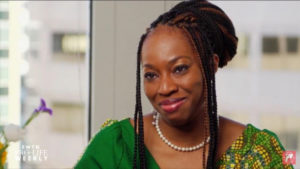 Ekeocha thought that she would be accustomed to life in the West when she moved to the U.K., having read many Western novels and watched movies, but she was in for a surprise. Prior moving to Europe she had never met more than five atheists in her whole life. “We don’t have big atheist communities in Africa because people understand you cannot be in a place where you do not have any safety net and not recognize that God is your safety net. Even the wealthy Nigerians still have to cling to God. We cling to God because at any point in time your life, your protection, your sustenance — that even breathing comes from God Almighty. And Africans are not ashamed to hold on to that child-like faith. We are unashamedly dependent on Him.”
Ekeocha thought that she would be accustomed to life in the West when she moved to the U.K., having read many Western novels and watched movies, but she was in for a surprise. Prior moving to Europe she had never met more than five atheists in her whole life. “We don’t have big atheist communities in Africa because people understand you cannot be in a place where you do not have any safety net and not recognize that God is your safety net. Even the wealthy Nigerians still have to cling to God. We cling to God because at any point in time your life, your protection, your sustenance — that even breathing comes from God Almighty. And Africans are not ashamed to hold on to that child-like faith. We are unashamedly dependent on Him.”
Obianuju Ekeocha
On one hand when we see millions of people starving it is easy to come to the conclusion that the population must be controlled. I am not in favor of abortion, especially if it is forced, but birth control seems to make sense. Not according to Ekeocha. In 2016, when speaking before the United Nations in New York during a session on best practices for maternal health in Africa at the Commission on the Status of Women, a video showing a portion of her remarks went viral. A Danish representative was provoked that Ekeocha would refer to the humanitarian efforts promoting abortion as “colonization” and argued that the Africans ought to regard this as a positive development, and let Africans make their own choices.
Ekeocha replied that if she tried to translate into the Igbo language what it means for a woman to “choose what to do with her body” and that abortion is somehow a good thing, she could not do it as there is no way of even phrasing such an idea in her tribal tongue.
“Culturally, most of the African communities actually believe, by tradition, by their cultural standards, that abortion is a direct attack on human life,” she said at the time.
“So for anybody to convince any woman in Africa that abortion is actually a good thing and can be a good thing, you first of all have to tell her that what her parents and what her grandparents and her ancestors taught her was actually wrong. You’re going to have to tell her that they have always been wrong in their thinking, and that is colonization.”


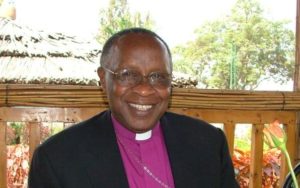
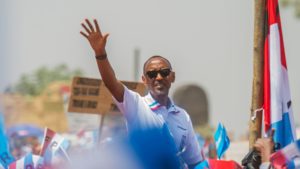
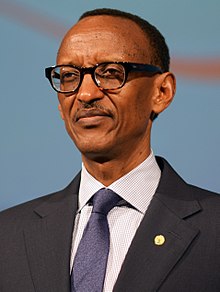


No Comment